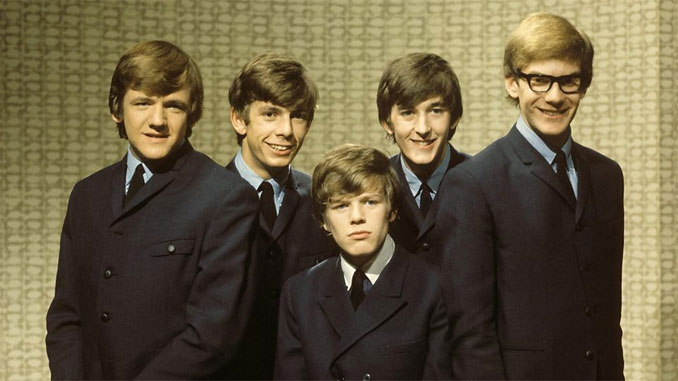
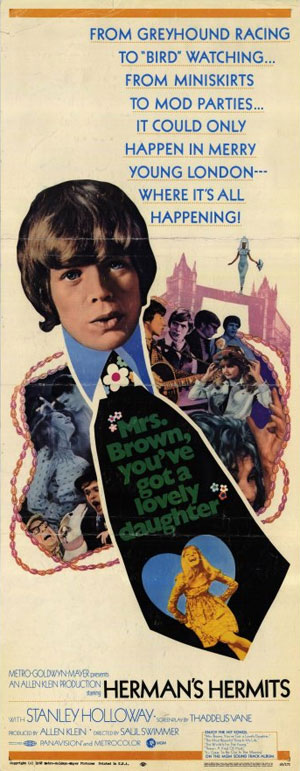 In the utterly go-go, trans-media flurry which was mid-Sixties pop(ular culture), every television star worth their Nielsens was expected to not only chase spies and rope steers, but compete with those rock ‘n’ rollers of the moment upon the Top Forty to boot. To cite but two examples, Lorne Bonanza Greene and his 1964 chart-topping Ringo, not to mention Captain James T. Kirk’s similarly Beatle-busting Transformed Man album. Which contained the possibly definitive version of Lucy In The Sky With Diamonds, I kid you not.
In the utterly go-go, trans-media flurry which was mid-Sixties pop(ular culture), every television star worth their Nielsens was expected to not only chase spies and rope steers, but compete with those rock ‘n’ rollers of the moment upon the Top Forty to boot. To cite but two examples, Lorne Bonanza Greene and his 1964 chart-topping Ringo, not to mention Captain James T. Kirk’s similarly Beatle-busting Transformed Man album. Which contained the possibly definitive version of Lucy In The Sky With Diamonds, I kid you not.
Conversely, the real rock stars of the day were fully expected to make their own stabs upon the silver screen as well, all the better an opportunity to cross-promote their latest singles, albums, custom lunchboxes and/or coast-to-coast public appearance tours. The Beatles, as they usually were, being first and foremost with their cinematic debut A Hard Day’s Night, which truly does remain the Citizen Kane of jukebox musicals as no less an authority as Andrew Sarris anointed it in 1964. Next up were Beatlepals Gerry and the Pacemakers on their own Ferry Cross The Mersey (complete with an original score by Gerry Marsden; his greatest musical moments ever), followed by the Dave Clark Five’s darkly cynical Catch Us If You Can aka Having a Wild Weekend (directed by a young John Boorman, it featured the longest hair and most abundant use of marijuana then displayed in a jukebox musical).
Meanwhile over on the circa-1965 AM radio dial, it’s not often recalled that a young band of upstarts from Manchester were actually out-selling those Beatles all over the North American charts, and they just happened to not only record for a label which conveniently owned its own movie studio, but were also fronted by a picture-perfect posterboy who (a) reminded their producer of a young John F. Kennedy, and (b) already possessed previous acting experience on British television.
The band was Herman’s Hermits, the label/studio MGM, the mop-topped JFK in question the one and only Peter Blair Denis Bernard “Birthday Boy” Noone, and the movies? Why, none other than those full-color, action-and-music-packed, guitar-beating romp ‘n’ rolling gems Hold On! and Mrs. Brown You’ve Got A Lovely Daughter.
Now it’s not quite known what, if anything, Andrew Sarris thought of these two spectacular quickies – I can find neither even mentioned within his landmark The American Cinema: Directors and Directions 1929-1968, for example – but both films more than achieved their goals in helping move still more seven-inch slices of monophonic vinyl while fitting perfectly alongside Harum Scarum and How To Stuff a Wild Bikini at the neighborhood drive-in slash make-out lot. Mission, then, Accomplished.
What is quite pleasantly surprising, however, is that the Original Motion Picture Soundtracks for both films have been re-released courtesy of the good folk over at ABKCO Records. And they honestly do contain more than their fair share of fab, fanciful, and fully-Hermanly numbers which, thanks in no small part to producer Mickie Most not only hold on, but hold up quite well against such period rock scores as Help! and even the Monkees’ magnificent Head.
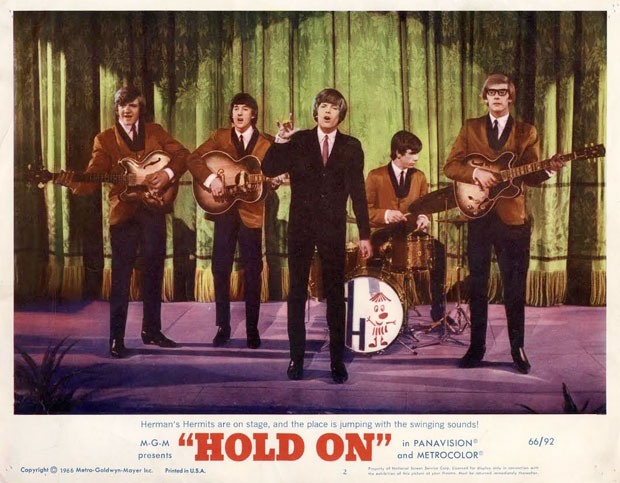
The Hold On! soundtrack especially, featuring four great P.F. Sloan/Steve Barri compositions, is shoulders above most of the 4/4 fluff then filling teen exploitation fare. In fact three of its numbers, A Must To Avoid, Leaning on the Lamp Post, and the Hold On! title number itself duly joined the slew of other multiple-million-selling Hermits records then dominating the North American airwaves. The Hold On! score also features, it should be noted, the debut appearance of Sloan/Barri’s Where Were You When I Needed You (which was soon to launch the career of The Grass Roots) plus a cinematically ultra-cute cut by co-star Shelley Fabares called Make Me Happy (Ms. Fabares, by the way, was then married to record mogul Lou Adler who, not at all coincidentally in the incestuous world of Sixties pop, also managed and published the aforementioned Sloan and Barri). You should also all make it a point to witness Shelley’s big fantasy number with Herman, The George And Dragon, which for three minutes launches Hold On! into flights of surrealism only hinted at during Magical Mystery Tour.
Two years later, The Monkees had swiftly replaced Herman & Co. upon teenage American bedroom walls and television screens, and the band was banished back to their homeland to eek out a few more hits – and one more movie under the auspices of their new manager (and major MGM stockholder) Allen Klein – before the bubbly inevitably burst. That movie, 1968’s Mrs. Brown You’ve Got A Lovely Daughter, may not have been set in outer space like some of Hold On! but was, quite refreshingly, much more down-to-earth. Literally… as it concerned the plight of the Hermits and their missing racing greyhound known as, yes, Mrs. Brown. Nevertheless, the music (arranged by a just-pre Zeppelin John Paul Jones) is as bouncy and colorful as the Hermits’ post-mod wardrobe – we’re treated to a revival of the band’s U.S. swansong There’s a Kind of Hush (All Over The World), for example – and, as for the film itself, I’d just have to agree with Bruce Eder, writing in Hollywood Rock, when he calls it “much more fun than Jean-Luc Godard’s Sympathy For The Devil,” another 1968 A. Klein production by the way.
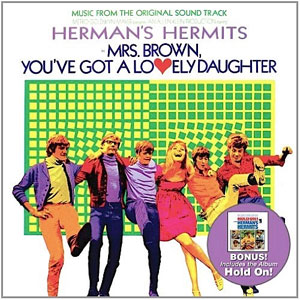 So! Two vintage-Sixties original motion picture soundtracks, twenty songs in under fifty minutes (plus a surprise Mrs. Brown’s Daughter session excerpt), great singing and playing by Peter Noone, Karl Green, Keith Hopwood, Barry Whitwam and the late, extremely great Derek “Lek” Leckenby, and all newly available on disc and for download via ABKCO. And PS: both the Hold On! and Mrs. Brown films themselves are back on DVD courtesy of the Warner Archive Collection, so you can once and for all find out precisely why NASA wanted to name its latest Gemini space capsule “Herman’s Hermits,” and how Stanley Holloway got Herman a job as a fruit peddler in a London grocery stall. Trust me: They just don’t make movies – or compose film scores – like these anymore at all!
So! Two vintage-Sixties original motion picture soundtracks, twenty songs in under fifty minutes (plus a surprise Mrs. Brown’s Daughter session excerpt), great singing and playing by Peter Noone, Karl Green, Keith Hopwood, Barry Whitwam and the late, extremely great Derek “Lek” Leckenby, and all newly available on disc and for download via ABKCO. And PS: both the Hold On! and Mrs. Brown films themselves are back on DVD courtesy of the Warner Archive Collection, so you can once and for all find out precisely why NASA wanted to name its latest Gemini space capsule “Herman’s Hermits,” and how Stanley Holloway got Herman a job as a fruit peddler in a London grocery stall. Trust me: They just don’t make movies – or compose film scores – like these anymore at all!


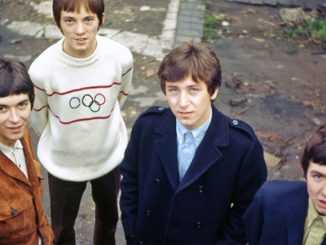
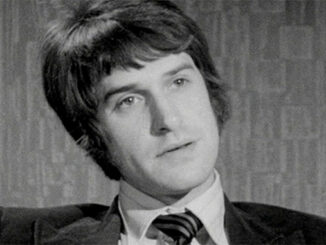
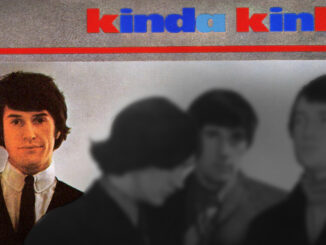
Be the first to comment